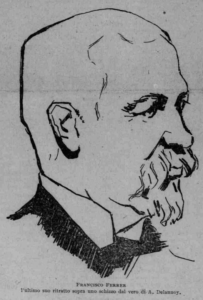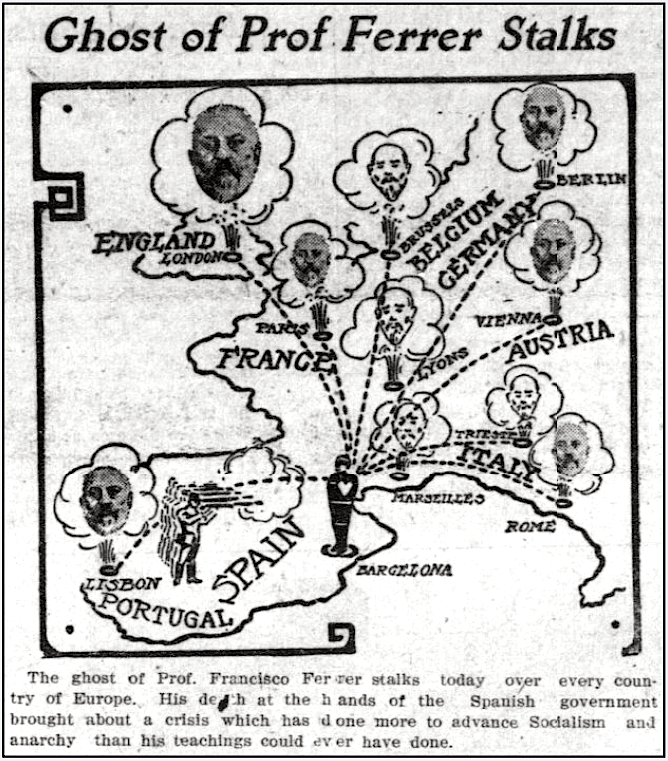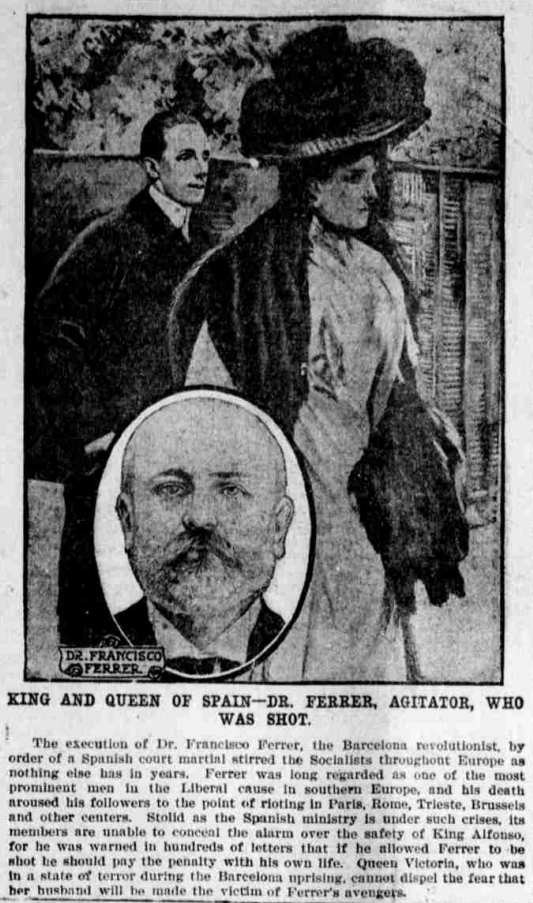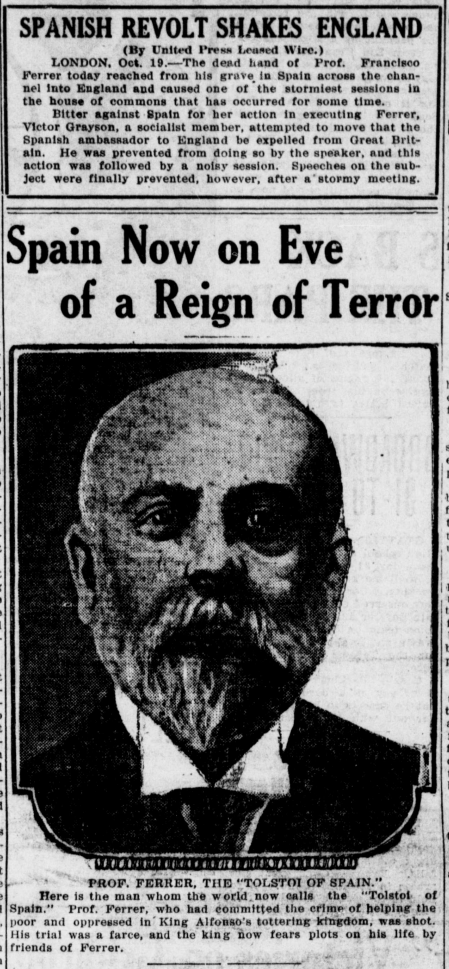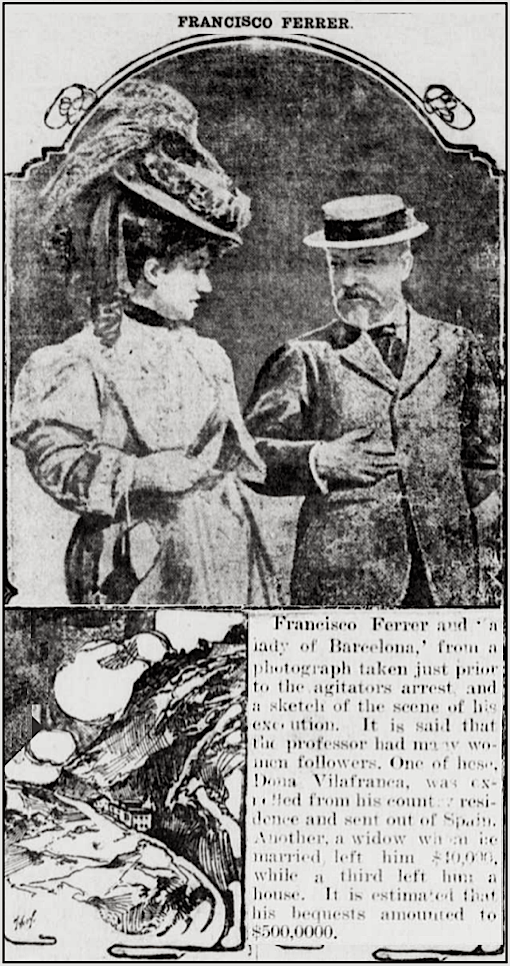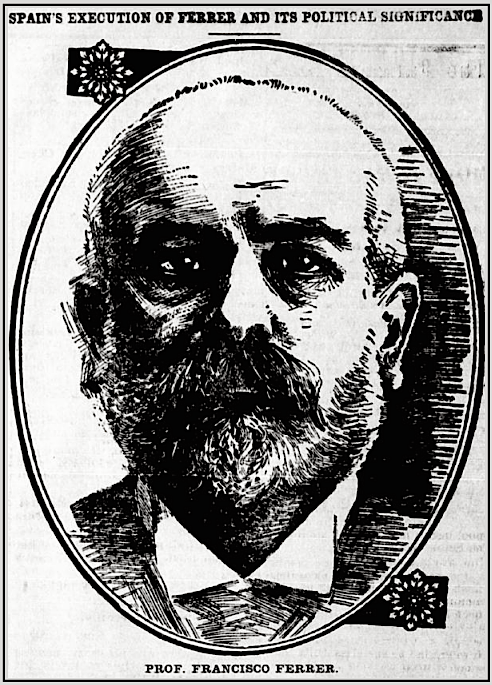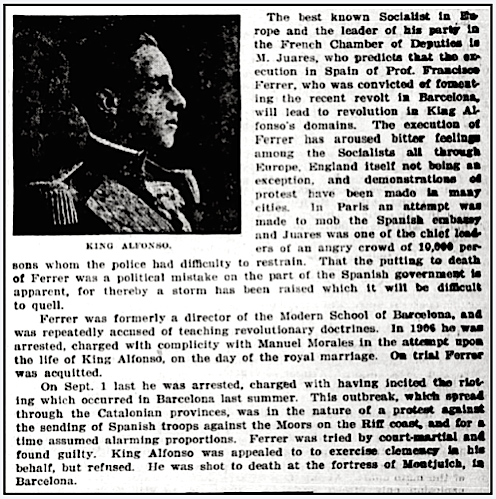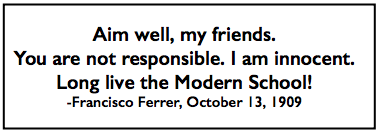 ———-
———-
Hellraisers Journal – Tuesday November 9, 1909
Western Federation of Miners Reports Execution of Prof. Ferrer
From The Miners Magazine of October 21, 1909:
Francisco Ferrer Spanish Martyr.
America gave a gasp of horror this morning when it read that Spain had condemned Francisco Ferrer to be shot for the crime of spreading intelligence in that country, says the Chicago Socialist.
“That would be going back ten centuries in the progress of civilization,” declared Dean Albion W. Small of the Chicago University graduate school and head of its department of sociology, when told of the death sentence that had been passed on Ferrer. “To execute a man of Ferrer‘s character and position would be a reversion to the dark ages,” he continued. “It would be a blot on the page of progress of today. I certainly do protest against it. I will join in any general protest that is made.”
“I also wish to join in any protest that is being made to save Ferrer from the sentence of execution that has been passed upon him. It is the duty of every man to protest,” said Dr. Herbert F. Fisk, head of the department of education at Northwestern University.
Numerous other educators of Chicago were equally emphatic in their denunciation of the tactics pursued by the Spanish government in seeking the death of one who is doing so much for the enlightenment of the human race. They were unanimous in their protest against a government so backward as to desire the destruction of one of its greatest intellectual leaders.
The feeling with which the death sentence that had been passed on Ferrer was received was akin to horror. It was known that Ferrer was in prison, the climax of several years of persecution by the church and government officials of Spain. It was known that his death was desired by many. It was not believed, however, that they would go so far as to make Ferrer a martyr in the face of the combined protest of civilized Europe.
Ferrer is looked upon in this country as the John Dewey of Spain. As Prof. Dewey of Columbia University urged his ideas in education in this country, so Ferrer has introduced modern education into Spain. It is considered that Spain is now in a position where the United States would be if it sought Dewey’s life because of his ideas on the education of children.
Since the execution of Ferrer there has been rioting in many cities in Spain, France, Italy, Belgium and other continental countries; Spaniards have had to bear the brunt of assaults by the enraged populace, and soldiers have with difficulty dispersed angry multitudes. It is feared that the martyrdom will result in further violence, loss of life and destruction of property.
In order that the readers of the Miners’ Magazine may read for themselves the facts surrounding the work of Ferrer, we reprint the following:
Professor Ferrer was first arrested by the Spanish government in 1906, which claimed that in some mysterious way he might possibly have been connected with the bomb outrages of that year. The government also attempted to suppress all educational movements of a liberal nature in Spain, even going so far as to seize moneys intended for the treasury of the modern school of Barcelona, which Ferrer founded in 1901.
Under the title of “The New Movement in Spain,” William Heaford, writing in the Progressive Journal of Education last January, told of Ferrer’s first arrest and of general educational conditions in Spain as follows:
Ferrer was in prison thirteen months and the government showed no intention of letting him go. He was there without having had any opportunity to make a defense. He was charged with no crime except that of trying to educate the Spanish people along modern lines, and there has never been any formal statement of a charge against him.
Finally, after thirteen months of absolutely illegal imprisonment the government was forced by pressure from the outside to bring his case to trial, and the prosecution went to pieces so badly that Ferrer was released. And so strong were the liberal influences growing out of the schools which Ferrer had founded in Spain that the costs of the trial were forced upon the clerical government.
It was quite evident that Ferrer, who has been the giant of the new educational movement in Spain, was destined from the beginning to a drumhead court martial and death. It was only the force of public opinion, created in large measure by the modern schools which he had founded, that saved him from that fate.
The campaign which resulted in his freedom was started by La Libre Pensee, a Parisian journal, but it was immediately taken up by all the liberal and radical papers of Europe, and a storm of indignation gathered above the Spanish authorities. A number of imposing manifestations were made, reflecting the horror of Europe at the contemplated crime of the clericals. In Italy Lombroso, Sergi, Odin and Buen, all noted scientists, protested against the incarceration of the great Spanish teacher. Such politicians as Rochefort, Vandervelde the Belgian Socialist, Naquet, and others roused the people. And a delegation from the universities of Europe was sent to the Spanish government with a message in behalf of the great scholar.
Even from the prison of Modelo Ferrer continued his writings and continued to send messages to the outside world. In a humorous vein he wrote at one time:
“All the world knows that I will be acquitted except the chief justice, Becerra del Toro. It is laughable. Think of such a question as this, ‘Who will be victor, the truth or Becerra del Toro and his Jesuits?'”
In the world of darkness, of ignorance, which the clericals and Jesuits are fighting to maintain in Spain. Ferrer is a great and shining light. His introduction of the Modern School and modern methods into Spanish education has made him one of the greatest fighting educators of his time. It is for this reason that the clericals hate him; they know that he is a light which must at all costs be extinguished. But that extinction has not yet come.
The condition of things which Ferrer tried to remedy, and this condition was horrible, by the founding of sanitary central schools, with provisions for recreation, is set forth in La Escuela Espagnola.
This journal shows the dreadful condition under which the schools of Spain found themselves under the clerical regime. It appears that there were in Spain during the month of July, 1907, 24,000 government schools, all of which were in a shocking condition, without light or ventilation-the abodes of death, ignorance and poor education.
Each year there are fifty thousand children who die of maladies contracted in these schools. Two hundred and fifty thousand come out of these schools broken in health. Besides this there are 480,000 children running the streets without any instruction whatever, given up to habits which make for their mental and moral deterioration. Thirty thousand blind children, 37,000 deafmutes, 67,000 children afflicted with mental disorders, and 45,000 delinquents are absolutely without any provision of any kind for their care or maintenance.
Add to this that the instructors are so ill paid that they often have to eke out their meager salaries by outside work, and the fact that there are in Spain ten million illiterates and 50,000 conscripts who enter the army every year unable to read and write, and you have the picture of what clericalism has done for the schools of Spain. There are only sixty institutes and ten universities in the whole country, and, as in the case of the common schools, the hygienic conditions of these schools is simply frightful. The contemplation of this sordid condition of education in Spain fixed the purpose of Ferrer to found the Modern School, as an example to a government at once negligent, ignorant and superstitious.
The Modern School was founded in Barcelona in 1901. It at once absorbed or reorganized a number of other schools throughout Catalonia and in other parts of Spain. So thoroughly was this work done that in the fourth year of its existence forty schools had copied its methods and its manuals. At this same time its influence began to make itself felt in other countries. For example, at San Paulo, in Brazil, at Lausane, in Switzerland, and at Amsterdam the books published by Ferrer were adopted by the schools which had been founded in these cities on the principles of the Modern School.
When the troubles of 1906 broke out there were about fifty such schools. At the end of the governmental persecutions a dozen or so of these schools were suppressed, chiefly the weaker schools; but new institutions and stronger ones sprang up everywhere. One of the most remarkable of these was the school known as La Nueva Humanidad at Valencia, which was founded while Ferrer was in prison, thanks to the enthusiastic efforts of Dr. Samuel Torner. This school, which counted 150 members last December and forty candidates for admission, is provided with all that is most modern in the way of hygienic and educational facilities.
The system of co-education of the sexes is a thorn in the side of the authorities. Writing from his prison on this subject Ferrer said:
“We will have real men and women when we give the children a rational and scientific education, not before. It is a pleasure to watch the boys and girls grow up in a spirit of camaraderie, with feelings of respect and friendship for each other. This has always been to me a touching spectacle. My whole aim has been to produce an education which should base society on affection and fraternity. To this end the most cordial relations have always existed in my schools between the master and the pupil. The master must be more than a personal instructor. He must be a personal friend.”
At Valencia, as elsewhere, the parents participate in the benefits from the Modern School: for example, on Sunday the lectures on health and hygiene are open to the parents of the pupils.
The Nueva Humanidad school at Valencia publishes a paper which has a circulation of 3,000 and which is spreading the idea of modern education in Spain.
At the present time there are more than fifty modern schools in Spain, and the ten schools in Barcelona alone have more than a thousand pupils. The libraries of the schools are spreading the modern idea far and wide ‘”La Castilla,” one of the books published by the Modern Schools, has run through three editions of 10,000 copies each, which for Spain is a most remarkable thing.
The Rationalist Press Association of England is assisting the Modern School in the publication of the various works bearing on the new idea.
Beaten in the attempt to suppress tho rationalist schools in Spain the government, headed by Maura, and forgetting the fate of France, under the cover of a new law, directed ostensibly against terrorism, is attempting to destroy the intellectual and liberal movement in Spain. Several explosions of bombs have taken place in Barcelona, and under pretext of guarding the public safety the government has delegated exceptional powers to the local authorities. The right to trial has been abolished and the attempt is made to put Catalona again under the heel of the clericals.
There is almost certain proof that the bomb outrages were the work of thugs in the employ of the clericals. An Englishman who was present at the time of certain of the outrages has even gone so far as to print an article entitled “Clericalism and Crime in Barcelona.”
it is not without the bounds of possibility that these criminal clericals will yet succeeded in persuading the government to suppress all modern schools in Spain, throwing the blame to their own acts upon the rationalists
To fight the movement a society known as the International League for Rational Education has been founded, with Ferrer for president and Professor Haeckel for one of the vice presidents. The league numbers among its members such well-known men as Professor Sergi and Alfred Naquet, the great rationalist.
The Modern School and its founder have every faith in the rationalist principle in education and in the value of the co-education of the sexes, and they look to the freer nations of the world for help in the struggle against the benighting influence of clericalism.
[Photograph and emphasis added.]
From The Miners Magazine of October 28, 1909:
From page 5-
The Victim of Spanish Despotism.
WHEN FRANCESCO FERRER was executed by the Spanish soldiers, in accordance with the orders of the court martial, who apparently “tried” him for complicity in military rebellion, he asked that he might be shot with his eyes unbandaged. This was denied him. “Long live the free schools,” he cried and expired with the simultaneous report of a dozen loaded guns.
In last week’s issue of the Magazine we printed a lengthy account of the work of this noted educator—this friend of Anatole France and Maeterlinck. He sought to release the schools in Spain from sectarian domination, and aimed to make them free schools in fact as well as in name. But it does not appear that his revolutionary ideas were ever used in the direction of the destruction of property or of inciting riot to further the ends of his cause. Even now that the man is dead and the Spanish government is on the defensive, compelled to apologize and explain, the reactionaries can not charge that Ferrer in any way encouraged what is known as the propaganda of the deed.
The circumstances surrounding the arrest, trial, sentence and execution of Ferrer are so much like the circumstances surrounding the arrest, deportation and trial of Moyer, Haywood and Pettibone, that they are here repeated:
The chief outrages in Barcelona happened on the 27th of July. Credible eye witnesses of the rioting, who have since narrated what they saw, are unanimous in affirming that the original accounts of the affair were greatly exaggerated. The chief attacks were upon the buildings of the cloistered orders, the majority of the assailants being “women and boys under twenty years of age.” No nuns or priests were killed; little pillaging took place; the mob seemed bent only upon the burning of the houses of the religious orders. But cavalry got possession of the streets finally; the rioters were driven up the hill of St. Martin; field artillery was trained on them then. The casualties were: 1,000 revolutions wounded; 126 revolutionists killed; 4 Red Cross nurses killed and 17 Red Cross nurses wounded. But Francesco Ferrer had no part in inciting that outbreak; it was altogether purposeless and spasmodic.
This sudden outbreak was attributed to the ignorance of the people. Only one-third of the people of Spain can read and write, and as Ferrer had established schools to teach the ignorant, his name was connected with the riots, and a charge of complicity in military revolution was promulgated against him.
September 1st he was arrested by some rural guards in a village ten miles from Barcelona. He had on his person a camera and a grammar of Esperanto, the universal language.
Then what? They put him in a wagon and sent him back to Barcelona under an escort of four of the guards. He was remanded to prison and the guard increased to a large body of mounted officers. Doesn’t that read just like what the officers of the law did in the case of the W. F. M. officials in Colorado and in Idaho!
And then the authorities began to search for evidence. Isn’t that exactly what happened in the Moyer, Haywood and Pettibone case? As soon as the men were safely behind the bars in the Idaho prison, then the hunt for evidence began. Why, it is exactly as though our own eminent theologue-detective McParland had charge of the whole Spanish affair.
Spanish military trials are held in the open, therefore “facts” were needed to satisfy the captain general. Were the facts forthcoming? Why of course. Don’t you remember how easy it was to find “evidence” against Moyer, Haywood and Pettibone—how “evidence” was so plentiful that they dug it up by front gate posts, and so on. You remember it all. And so it was in Barcelona. Fifteen days after the arrest of Ferrer a proclamation was “found” by the police in Ferrer’s house. And it was a strong one, because a strong one was needed. It started off like this: “You are all agreed upon a revolution.” Nobody had ever seen or heard of this document. It had never been circulated in public, but since it promised to “put to death persons in high places and the destruction of public buildings, it was enough to convict the unfortunate educator. Another document was “found.” It was the key to a cipher. And still another asked his comrades to let him know if they had supplies of arms, ammunition, dynamite, and money.
Talk about history repeating itself. Isn’t that just exactly what happened here in Colorado and in Idaho, when the agents of the mine owners had their victims in their clutches.
Then came the trial. The “documents” were backed up by an array of witnesses, one as unreliable as the other, but they were enough. Ferrer was found guilty of doing something that he had never even contemplated. He was sent to his death before a protest even could be made or heard. And the wonder is that the same thing didn’t happen here. All are agreed that the loud and strong and continued protest in America prevented the Idaho officials from carrying out their first purposes. But in Spain no prolonged public protest was heard, and Ferrer died.
Posterity will venerate Ferrer’s name. While the name of the bloody murderers will be held up to eternal infamy and execration as long as the human race exists.
[Emphasis added.]
From page 7-
Denouncing a Murder.
ALL EUROPE IS IN A TURMOIL. Every capital is in tumult. Gigantic meetings are listening to impassioned oratory. Governments are trembling in fear.
All because a man was murdered.
When Francisco Ferrer fell into his grave with his face disfigured by the bullets of a firing squad in Montjuich prison that grave became a platform from which he proclaimed his message to the world.
The first to take up that message and carry it on were the Socialists. Yet the Socialists have never claimed Ferrer. His work was a work of education and enlightenment, and as such could not help but make for Socialism. But the Socialist movement is today the avenue of progress, the voice of the oppressed, the only active enemy of oppression. So it was fitting that the Socialists should be fort-most in denouncing the assassination of Ferrer by the agents of Spain’s imbecile king.
A generation ago every newspaper in the United States would have seized upon the opportunity to attack the outgrown monarchies of Europe. The halls of congress would have been put at the disposal of those who wished to protest, as they were once thrown open to Robert Owen to tell the story of the beginning of the utopian Socialist movement. Politicians would have vied with one another in their efforts to gain the public ear by the violence of their denunciations of this murder.
Today those papers are silent. Today the working class stands almost alone in voicing the indignation of a people against tyranical assassination.
Today the President of the United States, instead of proclaiming the power and progress of republican institutions, instead of expressing the traditional hatred of monarchial usurpation, is offering the powerful aid of the United States government to keep another murderous assassin upon the throne of a neighboring nation.
It is not a mere accident that Taft‘s meeting with Diaz took place at the very moment when the rest of the world was denouncing all that Diaz stands for.
It is not an accident that the great mass of the daily press is silent or only mildly condemnatory of the murder of Ferrer, while their news columns are filled with distortions of the situation in Europe.
The capitalist class of the United States, the great industrial rulers of America, are united by powerful bonds of interest with the tyrants of the older continent. Their affiliations are with czars and emperors and kings and dictators and not with the spirit of republican institutions. Therefore no protest comes from them, and their warmest friendship is for those to whom the government of this country was once supposed to stand in antagonism.
The spirit of liberty and progress lives today only in the working class. It finds its truest expression in the great international Socialist movement:-—Daily Socialist, Chicago.
[Photograph and emphasis added.]
From Ohio’s Marion Daily Mirror of October 18, 1909:
From The Tacoma Times of October 19, 1909:
From West Virginia’s Bluefield Evening Leader of October 27, 1909:
From Canton’s [South] Dakota Farmers’ Leader of November 5, 1909:
~~~~~~~~~~~~~~~~~~~~~~
SOURCES
Quote Ferrer, Aim Well, per Avrich, Modern School Mv-p32
https://books.google.com/books?id=X6X_AwAAQBAJ
The Miners Magazine
“Published Weekly by the
Western Federation of Miners”
(Denver, Colorado)
-Oct 21, 1909
https://play.google.com/books/reader?id=hT8tAQAAMAAJ&printsec=frontcover&pg=GBS.RA1-PA118
“Francisco Ferrer Spanish Martyr”
https://play.google.com/books/reader?id=hT8tAQAAMAAJ&printsec=frontcover&pg=GBS.RA1-PA125
-Oct 28, 1909
https://play.google.com/books/reader?id=hT8tAQAAMAAJ&printsec=frontcover&pg=GBS.RA1-PA134
“Victim of Spanish Despotism”
https://play.google.com/books/reader?id=hT8tAQAAMAAJ&printsec=frontcover&pg=GBS.RA1-PA138
“Denouncing a Murder”
https://play.google.com/books/reader?id=hT8tAQAAMAAJ&printsec=frontcover&pg=GBS.RA1-PA140
IMAGES
Francisco Ferrer, Cronaca Sovversiva p1, Oct 23, 1909
https://chroniclingamerica.loc.gov/lccn/2012271201/1909-10-23/ed-1/seq-1/
Francisco Ferrer, Ghost Stalks Europe, Bisbee Dly Rv p1, Nov 5, 1909
https://chroniclingamerica.loc.gov/lccn/sn84024827/1909-11-05/ed-1/seq-1/
Francisco Ferrer w King of Spain, Marion Dly OH p1, Oct 18, 1909
https://chroniclingamerica.loc.gov/lccn/sn88077573/1909-10-18/ed-1/seq-1/
Francisco Ferrer, Spain Terror, Tacoma Tx p1, Oct 19, 1909
https://chroniclingamerica.loc.gov/lccn/sn88085187/1909-10-19/ed-1/seq-1/
Francisco Ferrer w Lady, Bluefield WV Eve Ldr p1, Oct 27, 1909
https://chroniclingamerica.loc.gov/lccn/sn86092066/1909-10-27/ed-1/seq-1/
Ferrer, Execution Results, Canton SD Frmr Ldr p3, Nov 5, 1909
https://chroniclingamerica.loc.gov/lccn/sn00065127/1909-11-05/ed-1/seq-3/
See also:
Tag: Francisco Ferrer
https://weneverforget.org/tag/francisco-ferrer/
Progressive Journal of Education, Volume 1
(Chicago, Illinois)
-Nov 1908 to June 1909
https://books.google.com/books?id=rmgXAQAAMAAJ
-Jan 1909, Vol. 1, No.3
https://play.google.com/books/reader?id=rmgXAQAAMAAJ&hl=en&pg=GBS.PA49
“The New Movement in Spain” by William Heaford
https://play.google.com/books/reader?id=rmgXAQAAMAAJ&hl=en&pg=GBS.PA64
The Modern School Movement
Anarchism and Education in the United States
– by Paul Avrich
Princeton University Press, Jul 14, 2014
(search: ferrer)
https://books.google.com/books?id=X6X_AwAAQBAJ
Cronaca Sovversiva
(Barre, Vermont)
-Oct 16, 1909
https://chroniclingamerica.loc.gov/lccn/2012271201/1909-10-16/ed-1/seq-1/
Search: “Francisco Ferrer” Cronaca Sovversiva, 1909
https://chroniclingamerica.loc.gov/search/pages/results/?lccn=2012271201&dateFilterType=range&date1=01%2F01%2F1909&date2=12%2F31%2F1909&language=&ortext=&andtext=&phrasetext=%22francisco+ferrer%22&proxtext=&proxdistance=5&rows=50&searchType=advanced&sort=date
~~~~~~~~~~~~~~~~~~~~~~~~~~~~~~~~~~~~~~~~~~~~~
Emma Goldman, “Anarchism and Other Essays”
Chapter 6 – Francisco Ferrer and the Modern School
The Commonwealth of Toil – Ralph Chaplin

